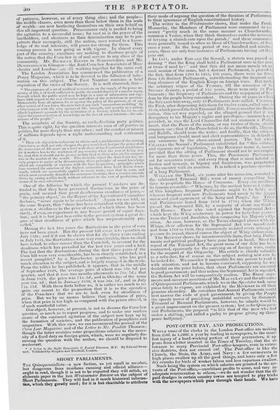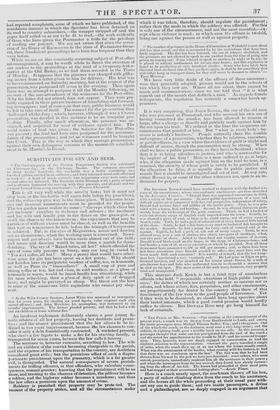POST-OFFICE PAY, AND PROSECUTIONS.
Writes some of time clerks in the London Post-office are making from 250/. to 1,200/. a year by trading in newspapers, to the mani- fest injury of a hard-working portion of their paymasters, it ap pears from a letter inserted in the Times of Tuesday, that time al- lowance to many Provincial Post-office-keepers, even in exten- sive districts, does not exceed ea The Post-office is like the Church, the State, the Army, and Navy : a few cormorants in high places swallow up all the good things, and leave only a few dry crumbs for birds of weaker talons and less capacious swallow. Such being'the system on which salaries are granted to the ser- vants of the Post-office,—exorbitant profits to some, and very in- adequate remuneration to others,—we do not wonder that the ill- paid drudges in certain country towns are tempted to play tricks with the newspapers which pass through their hands. We have had repeated complaints, some of which we have published, of the scandalous manner in which the Spectator has been detained on its road to country subscribers,—the wrapper stripped off and the paper itself soiled so as not to be fit to read,—the work evidently of those who have given the Postmaster a trille for the privilege cf reading our journal. We are not aware that since the acces- sion of his Grace of then MOND to the place of Postmaster-Gene- ral, these fraudulent proceedings have been less frequent than they were before.
While we are on this constantly-recurring subject of Post-office mismanagement, it may be worth while to direct the attention of our readers to the proceedings at the trial of a twopenny-letter- carrier at the Old Bailey, as we find them recorded in the Times. of Monday. It appears that the prisoner was charged with pilfer- ing money from a letter given to hint for delivery. His trial was to have commenced on Sattuday morning, but at the request of the prosecution, was postponed till seven in the evening. Then again there was an attempt to postpone it till the Monday following, on -account of the non-attendance of the witnesses for the Post-office. Tilly the latter did not attend, does not appear. They were pro- bably engaged in their private business of translating and forward- ing newspapers; and of course, in that case, public business would be left to take care of itself. The counsel for the prosecution then -hallenged all theJ ury ; which, however, although it was a Crown prosecution, was decided in this instance to be an irregular. pm- reeding. Finally, after much altercation, the prisoner was ar- raigned, and acquitted for want of evidence against him. The usual notice of trial was given ; the Solicitor for the Post-office was present ; the trial had been once postponed for the accommo- dation of the prosecution ; and yet no witnesses could be brought into Court. This is the way in which they manage prosecutions against their own delinquent servants at the mammoth establish- ment in St. Martin's-le-Grand.























 Previous page
Previous page